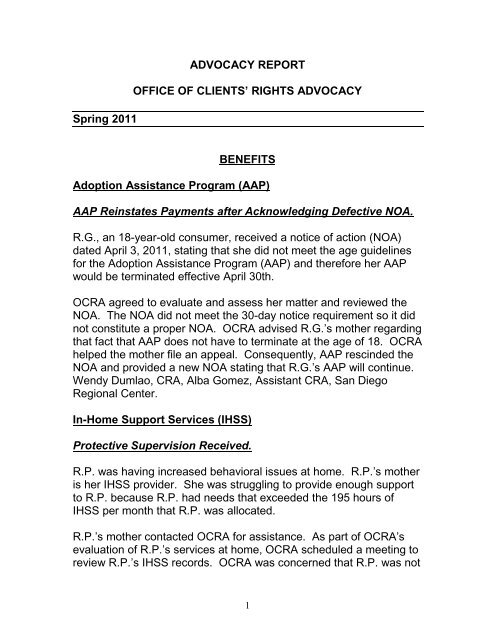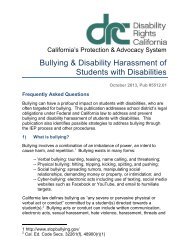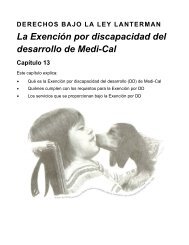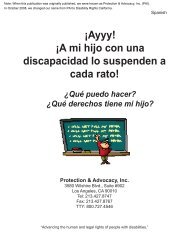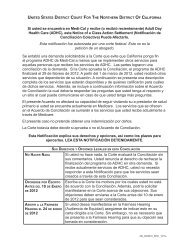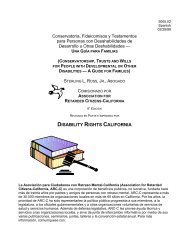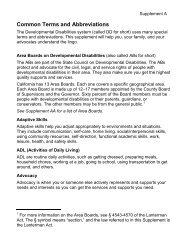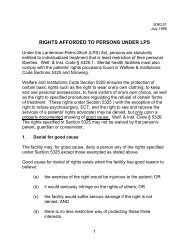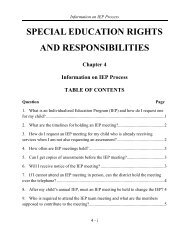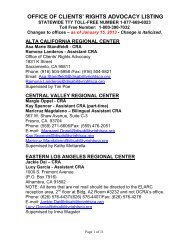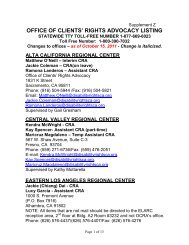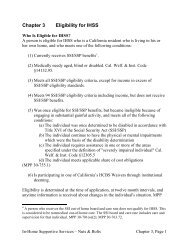Advocacy Report Winter - Disability Rights California
Advocacy Report Winter - Disability Rights California
Advocacy Report Winter - Disability Rights California
Create successful ePaper yourself
Turn your PDF publications into a flip-book with our unique Google optimized e-Paper software.
Spring 2011<br />
ADVOCACY REPORT<br />
OFFICE OF CLIENTS’ RIGHTS ADVOCACY<br />
BENEFITS<br />
Adoption Assistance Program (AAP)<br />
AAP Reinstates Payments after Acknowledging Defective NOA.<br />
R.G., an 18-year-old consumer, received a notice of action (NOA)<br />
dated April 3, 2011, stating that she did not meet the age guidelines<br />
for the Adoption Assistance Program (AAP) and therefore her AAP<br />
would be terminated effective April 30th.<br />
OCRA agreed to evaluate and assess her matter and reviewed the<br />
NOA. The NOA did not meet the 30-day notice requirement so it did<br />
not constitute a proper NOA. OCRA advised R.G.’s mother regarding<br />
that fact that AAP does not have to terminate at the age of 18. OCRA<br />
helped the mother file an appeal. Consequently, AAP rescinded the<br />
NOA and provided a new NOA stating that R.G.’s AAP will continue.<br />
Wendy Dumlao, CRA, Alba Gomez, Assistant CRA, San Diego<br />
Regional Center.<br />
In-Home Support Services (IHSS)<br />
Protective Supervision Received.<br />
R.P. was having increased behavioral issues at home. R.P.’s mother<br />
is her IHSS provider. She was struggling to provide enough support<br />
to R.P. because R.P. had needs that exceeded the 195 hours of<br />
IHSS per month that R.P. was allocated.<br />
R.P.’s mother contacted OCRA for assistance. As part of OCRA’s<br />
evaluation of R.P.’s services at home, OCRA scheduled a meeting to<br />
review R.P.’s IHSS records. OCRA was concerned that R.P. was not<br />
1
eceiving more IHSS hours. When asked, the IHSS worker stated<br />
that the policy for children was to provide a maximum amount of 195<br />
hours per month. OCRA explained that this was incorrect and that<br />
R.P. was in need of protective supervision.<br />
R.P.’s IHSS case manager called OCRA the following day, stating<br />
that R.P. was eligible for the maximum amount of IHSS protective<br />
supervision hours. R.P. is now eligible for 283 hours of IHSS<br />
support. Yulahlia Hernandez, CRA, Annie Breuer, Assistant CRA,<br />
North Bay Regional Center.<br />
M.G. Secures 195 Hours of IHSS Protective Supervision.<br />
M.G.’s parent contacted OCRA for assistance in preparing for M.G.’s<br />
hearing to appeal the County’s determination that M.G. did not qualify<br />
for protective supervision services under the IHSS program. OCRA<br />
agreed to review the numerous records and helped the parent<br />
prepare the evidence and a brief prior to hearing. M.G. received a<br />
favorable decision awarding him 195 hours of protective supervision.<br />
Ibrahim Saab, CRA, Ada Hamer, Assistant CRA, North Los Angeles<br />
County Regional Center.<br />
K.M. Obtains Protective Supervision.<br />
K.M. was denied IHSS protective supervision. The CRA assisted<br />
K.M.’s mother in appealing the denial and preparing for hearing.<br />
K.M.’s mother provided the County Representative with medical and<br />
educational records that substantiated the need for protective<br />
supervision services. K.M.’s mother agreed to the County’s request<br />
to conduct a 30-day reassessment. Based upon the newly submitted<br />
documents, a hearing was avoided, and K.M. was found eligible to<br />
receive protective supervision. Jacqueline Miller, CRA, Cynthia<br />
Salomon, Assistant CRA, Regional Center of Orange County.<br />
Successful IHSS Hearing Due to Technical Assistance from<br />
OCRA.<br />
H.C. is a regional center consumer with severe autism, a seizure<br />
disorder and a sleep disorder who was denied protective supervision<br />
by IHSS. H.C.’s parent contacted OCRA to request assistance to<br />
2
appeal the decision. OCRA provided technical assistance to the<br />
parent by helping her prepare her hearing position statement and<br />
evidence packet. The parent represented H.C. at hearing and<br />
received a favorable decision. H.C.’s hours were increased from 237<br />
to 272 hours for protective supervision. Filomena Alomar, Assistant<br />
CRA, San Andreas Regional Center.<br />
ALJ Agrees that A.S. Qualified for Protective Supervision.<br />
A.S. came to OCRA’s office with her sister and primary caregiver,<br />
O.R. They explained to OCRA that they had been experiencing<br />
difficulties in convincing A.S.’s IHSS social worker that A.S. qualified<br />
for protective supervision despite obtaining two signed SOC 821<br />
forms from A.S.’s doctors. In fact, the group had been trying for over<br />
two years to get A.S. protection supervision hours.<br />
OCRA obtained a copy of A.S.’s regional center file and requested<br />
records from IHSS. OCRA reviewed the documents and gathered<br />
evidence supporting A.S.’s need for protective supervision.<br />
The needs were numerous.<br />
OCRA represented A.S. at a state hearing and received a fully<br />
favorable decision in which the judge agreed that A.S. met the criteria<br />
for protective supervision and granted it retroactively to the date of<br />
application. Jackie S. Chiang, CRA, Lucy Garcia, Assistant CRA,<br />
Eastern Los Angeles Regional Center.<br />
Medi-Cal<br />
Medi-Cal Approves Funding for Pediatric Wheelchair.<br />
D.R. is a 7-year-old with complex medical and developmental needs.<br />
D.R. utilized a convaid stroller (small foldable stroller) to meet his<br />
mobility needs beginning in early childhood. D.R. outgrew his stroller<br />
even though it had been modified to maximum capacity. The convaid<br />
stroller was no longer safe to use due to its small size and<br />
configuration.<br />
Based on the conclusion that the stroller was no longer safe for<br />
D.R.’s use, the regional center completed a referral for an OT<br />
3
assessment. OT recommended a Zippie Pediatric Wheelchair (larger<br />
with customized support and frame) for safe mobility and<br />
transportation to and from school and to increase mobility at home<br />
and in the community. D.R. had never owned or used a wheelchair.<br />
Medi-Cal denied the wheelchair request and stated it was not<br />
medically necessary.<br />
OCRA represented D.R. in his Medi-Cal appeal. OCRA reviewed the<br />
OT report and requested a second OT assessment. OCRA filed the<br />
Medi-Cal appeal with the additional report. Medi-Cal reviewed the<br />
new report, made a finding that medical necessity did exist, and<br />
authorized funding for the wheelchair. Leinani Walter, CRA, Christine<br />
Hager, Assistant CRA, Valley Mountain Regional Center.<br />
Medi-Cal Reinstated.<br />
S.B. works full time and receives 1:1 employment support services<br />
because of his disability. S.B. contacted OCRA after receiving a<br />
notice that he was no longer eligible for Med-Cal under the 250%<br />
Working Disabled Program because his income was slightly above<br />
the eligibility requirements. Since S.B. was no longer eligible for the<br />
program, he was going to have to pay a $2,700 monthly share of cost<br />
for his IHSS.<br />
OCRA assisted S.B. with a hearing request so that he could receive<br />
aid paid pending the hearing. OCRA provided S.B. with technical<br />
assistance and found that his mileage to and from work could be<br />
deducted from his income as an Impairment Related Work Expense<br />
(IRWE). OCRA assisted S.B. in gathering documentation of his<br />
IRWE and submitting it to Medi-Cal to try and resolve the issue<br />
without going to hearing.<br />
Medi-Cal quickly determined that S.B. was eligible for Medi-Cal under<br />
the 250% Working Disabled Program because of his IRWE. S.B. is<br />
now eligible for Medi-Cal again and does not have to pay a share of<br />
cost for his IHSS services. Yulahlia Hernandez, CRA, Annie Breuer,<br />
Assistant CRA, North Bay Regional Center.<br />
OCRA Assists A.H to become Eligible for No Share-of-Cost<br />
Medi-Cal.<br />
4
A.H.’s family contacted OCRA for help in appealing Medi-Cal's written<br />
notice that A.H. no longer qualified for no share-of-cost Medi-Cal.<br />
After reviewing A.H.’s eligibility criteria for the different Medi-Cal<br />
programs, OCRA determined that Medi-Cal should have found A.H.<br />
eligible for the no share-of-cost Medi-Cal. OCRA agreed to provide<br />
direct representation to A.H. and contacted the County’s Department<br />
of Social Services (County).<br />
Following communications with OCRA, the County agreed to<br />
reassess A.H.’s eligibility for Medi-Cal benefits without a share-ofcost.<br />
A.H. was subsequently found eligible to receive Medi-Cal<br />
benefits without incurring a share-of-cost. Ibrahim Saab, CRA, Ada<br />
Hamer, Assistant CRA, North Los Angeles County Regional Center.<br />
Social Security<br />
SSI Overpayment Waived.<br />
M.B. received an overpayment notice from SSI informing her that she<br />
owed over $5,000. The overpayment was allegedly due to having<br />
excess resources. OCRA assisted M.B. with filing appeal forms that<br />
explained why the overpayment was miscalculated. Every month,<br />
M.B.’s Supported Living Services Agency (SLS) processed the rent<br />
payment by putting M.B.’s roommate’s rent contribution into M.B.’s<br />
bank account. Then the rent check was issued. M.B. was unaware<br />
of this process.<br />
After the Social Security Administration (SSA) reviewed M.B.’s<br />
appeal, the SSA notified M.B. of its intent to deny her appeal. OCRA<br />
accompanied M.B. to the SSA office to meet with a representative.<br />
The SSA representative began the meeting by explaining that M.B.<br />
was responsible and that there was proof that M.B.’s account had, on<br />
numerous occasions, a balance of more than $2,000.<br />
OCRA explained the nature of the problem to the SSA and advised<br />
the SSA that the improper deposits to M.B.’s account had stopped.<br />
OCRA further explained that it was not possible for M.B. to be at fault<br />
since she did not know about the improper deposits to her bank<br />
account. In addition, the SLS agency provided a signed letter<br />
explaining its responsibility for the improper account activities. SSA<br />
5
determined that M.B. was not responsible. The entire overpayment<br />
was waived. Katy Lusson, CRA, Trina Saldana, Assistant CRA,<br />
Golden Gate Regional Center.<br />
SSI Agrees to Waive $10,000 Overpayment and Reinstate<br />
Benefits.<br />
Three years ago, L.G. and his mother received a notice of a $10,000<br />
overpayment in L.G.’s SSI grant. The SSA asserted that L.G. had<br />
been overpaid due to his mother’s, who was his representative<br />
payee, savings account that was over the resource limit. L.G.’s<br />
mother filed a waiver of overpayment arguing that L.G. should not be<br />
found at fault because the mother had been told by SSI staff that it<br />
was okay to save the money, and she had been reporting this<br />
resource properly to SSI. The waiver of overpayment was denied<br />
and L.G. was required to make $100 per month payments to SSI.<br />
L.G. then stopped receiving SSI benefits. However, L.G. continued to<br />
make the monthly payments for two years.<br />
L.G. and his mother contacted OCRA for assistance as they were no<br />
longer able to afford the monthly SSI payments. OCRA agreed to<br />
represent L.G. OCRA argued at an SSI informal meeting that L.G.<br />
should not be found liable for any overpayment caused by his<br />
representative payee, as L.G. was unable to understand or comply<br />
with the rules of the program. OCRA further argued that L.G.’s SSI<br />
benefits should be reinstated immediately. SSI determined that L.G.<br />
was not at fault nor liable for the overpayment. SSI also reinstated<br />
L.G.’s SSI benefit in the full amount. Kendra McWright, CRA, Kay<br />
Spencer, Assistant CRA, Maricruz Magdaleno, Temporary Assistant<br />
CRA, Central Valley Regional Center.<br />
R.H. Gets Benefits Reinstated and $80,257 Overpayment<br />
Cleared.<br />
R.H. is a 51-year-old man who has been working at a store for over<br />
eight years. He receives periodic raises. He also receives Social<br />
Security benefits as a disabled adult child. A regional center vendor<br />
was serving as his representative payee. One day, the payee<br />
received a notice from the SSA that R.H.’s disability had ended and<br />
he had incurred an overpayment of $80,257 because R.H. was<br />
6
allegedly performing substantial work. The payee did not appeal or<br />
contact the SSA. The payee gave the notice to R.H.’s SLS provider<br />
about two months after receipt of the notice. The SLS provider called<br />
OCRA.<br />
OCRA asked R.H. about his work, and if OCRA could contact his<br />
supervisor. OCRA learned that R.H. is not able to perform all of the<br />
duties in the job description for his position. R.H. performs about fifty<br />
percent of the work that a non-disabled employee in the same<br />
position performs. Further, R.H. is paid almost double the amount of<br />
a non-disabled employee in the same position, because he has been<br />
there so long and received many raises. R.H.’s supervisor completed<br />
the subsidy form (SSA Work Activity Questionnaire).<br />
OCRA filed an appeal of the disability cessation and ask for<br />
expedited reinstatement, citing many reasons for good cause for late<br />
filing. OCRA provided evidence of subsidy, which meant that R.H.<br />
was not performing substantial work, is still eligible for benefits, and<br />
the overpayment should be cleared. SSA agreed and reinstated<br />
R.H.’s benefits as of the date the benefits were erroneously<br />
terminated. The Trial Work Period was recalculated and the<br />
overpayment was cleared. Katie Meyer, CRA, Luisa Delgadillo,<br />
Assistant CRA, Westside Regional Center.<br />
S.G.’s SSI Payments Are Reinstated and Overpayment Cleared.<br />
S.G. is a child who was receiving SSI. He received a notice that his<br />
SSI was being terminated and he had a $2,221 overpayment. OCRA<br />
investigated and learned S.G.’s parents’ wages did not change, nor<br />
did anything else in S.G.’s household.<br />
After reviewing notices, OCRA determined that the SSA was<br />
attributing the father’s earned income to S.G. Instead of using the<br />
deeming formula, SSA used the earned income formula, which made<br />
S.G. ineligible for SSI and caused an overpayment. OCRA contacted<br />
the SSA and asked it to input S.G.’s income properly, reinstate his<br />
SSI, and clear his overpayment, which the SSA did. Katie Meyer,<br />
CRA, Luisa Delgadillo, Assistant CRA, Westside Regional Center.<br />
7
Two Brothers Do Not Have to Repay Overpayments.<br />
T.J. and K.J. are two brothers who were receiving both SSI and<br />
Disabled Adult Child (DAC) benefits from the SSA. T.J. and K.J.<br />
received DAC benefits because their mother and father were both<br />
receiving Social Security <strong>Disability</strong> Insurance (SSDI) benefits.<br />
T.J. and K.J. each received notice that they incurred a DAC<br />
overpayment. K.J.’s overpayment was $3,842 and T.J.’s was $7,478,<br />
since he is older and had been receiving DAC for more years. The<br />
notice contained no information on how the overpayment occurred.<br />
OCRA agreed to investigate and ask for a proper notice. SSA told<br />
OCRA that in 2004, the brothers’ father became ineligible for SSDI.<br />
However, the SSA continued to pay not only the father, but also K.J.<br />
and T.J., under the father’s earnings record. In fact, the DAC benefits<br />
were calculated using the “combined family maximum,” since both<br />
parents received SSDI. Once their father became ineligible, K.J. and<br />
T.J. were only eligible for a reduced amount, yet SSA continued to<br />
pay them the same amount for the next six years.<br />
OCRA filed a request for waiver on behalf of both clients. OCRA<br />
explained that neither K.J. nor T.J. could have known that their father,<br />
who does not live with them, was erroneously receiving SSDI.<br />
Therefore, the brothers were without fault in causing the<br />
overpayment. OCRA also asserted that the brothers could not afford<br />
to pay the overpayment because their sole income is SSI and DAC<br />
benefits. SSA agreed and waived both overpayments. Katie Meyer,<br />
CRA, Luisa Delgadillo, Assistant CRA, Westside Regional Center.<br />
SSA Increases Amount of SSI for Twins.<br />
Twins, J.A. and J.A.A, were receiving monthly SSI benefits of $151<br />
each because SSI erroneously deemed almost all of their mother’s<br />
workers compensation income to the twins. OCRA assisted by<br />
helping the mother file a request for reconsideration and completing a<br />
deeming worksheet with the correct income calculations. After a<br />
meeting with SSI, the twins were reassessed and received $486 in<br />
SSI each per month, in addition to retroactive benefits for the months<br />
that were incorrectly calculated. Shortly after this, a new SSI notice<br />
8
was sent. OCRA determined that the twins were each due $250<br />
more a month because SSI had again failed to fully account for two<br />
children with disabilities in the household. OCRA assisted the mother<br />
in filing a new request for reconsideration, providing SSI with another<br />
re-calculation and a copy of the appropriate SSI law. SSI sent yet<br />
another notice decreasing each child’s SSI amount by $30 a month.<br />
A third request for reconsideration has been filed. OCRA plans to<br />
assist J.A. and J.A.A’s mother at the SSI informal conference to<br />
discuss this new notice. Margaret Oppel, CRA, Gina Gheno,<br />
Assistant CRA, Tri-Counties Regional Center.<br />
CONSUMER FINANCE<br />
Debt Issue Following Property Damage Resolved.<br />
W.F. lives in a behavioral supported living situation. W.F. had a<br />
disagreement in the home and allegedly vandalized a staff member’s<br />
car that was parked outside. The insurance company wanted W.F. to<br />
pay $200 per month for the property damage. The regional center<br />
social worker had been negotiating with the insurance company but<br />
to no avail. OCRA was called to assist W.F.<br />
OCRA called the insurance company and spoke directly with the<br />
agent. OCRA explained that W.F.’s only income was SSI and that<br />
W.F. could not possibly pay $200 a month. OCRA wrote a letter to<br />
the insurance company memorializing this conversation. The<br />
insurance company decided not to pursue the matter. Katy Lusson,<br />
CRA, Trina Saldana, Assistant CRA, Golden Gate Regional Center.<br />
OCRA Works with Regional Center to Get Debt Collection<br />
Dismissed.<br />
C.M. contacted OCRA for advocacy assistance in getting an<br />
outstanding debt collection dismissed. During the summer of 1995,<br />
C.M. had dental work performed. Because the dental work had been<br />
denied for funding through Medi-Cal, the regional center had agreed<br />
to pay for the dental work. For several reasons, payment had not<br />
been credited as payment in full and C.M. was receiving harassing<br />
phone calls and correspondence from collection agencies. OCRA<br />
contacted the regional center which agreed to involve its attorney<br />
9
since the regional center had paid for the dental work. After several<br />
months, OCRA received confirmation that the dental firm agreed to<br />
relieve the debt, thereby releasing C.M. from any liability. C.M.<br />
recently received written confirmation indicating that the debt has<br />
been relieved. Veronica Cervantes, CRA, Beatriz Reyes, Assistant<br />
CRA, Inland Regional Center.<br />
HOUSING<br />
Reasonable Accommodation Granted by Housing Authority.<br />
R.A. has been receiving Section 8 Voucher rental assistance since<br />
2008. She was renting a two-bedroom apartment with her minor son,<br />
though he turned eighteen within the last year. R.A.’s son, both while<br />
a minor and as an adult, was charged and convicted of drug and<br />
gang related activity. R.A. did not report this to the Housing Authority<br />
during the annual re-certification process.<br />
R. A. suffers from a seizure condition due to a brain tumor. She has<br />
had three brain operations, both to remove tumors and to lessen<br />
seizure activity. The seizures have resulted in memory loss.<br />
The Housing Authority gave R.A. a notice terminating her subsidy,<br />
and seeking to collect as an overpayment all assistance paid after<br />
R.A.’s failure to report her son’s criminal activity.<br />
OCRA was contacted by R.A. and assisted her with making an<br />
Informal Hearing request, and represented her at the hearing. The<br />
Hearing Officer found that a credible argument was presented that<br />
R.A. suffers from disabilities that impair or prevent her ability to<br />
ensure compliance with obligations as they relate to household<br />
members. The Hearing Officer also found that R.A. had not realized<br />
that she could have asked for a reasonable accommodation from the<br />
Housing Authority.<br />
The Hearing Officer determined there was evidence that R.A. suffers<br />
from mental disabilities and may not have been fully cognizant of her<br />
responsibilities, and reversed the termination of her assistance on the<br />
condition that her son not reside in the home. Andy Holcombe, CRA,<br />
Far Northern Regional Center.<br />
10
OCRA Helps L.V. Get Guardianship and Save Housing.<br />
L.V., a 15-year-old consumer, lived with her grandmother, also her<br />
legal guardian, in federally subsidized housing. The regional center<br />
had funded structural modifications to make the townhouse fully<br />
accessible to L.V. These modifications included a specialized lift.<br />
L.V.’s grandmother became terminally ill and could no longer live in<br />
her private home with L.V. L.V.’s long time IHSS worker was willing<br />
to become L.V.’s guardian and move into the home to care for her.<br />
OCRA referred the family to the Self Help Law Project at the local<br />
courthouse for assistance in obtaining the new guardianship.<br />
Meanwhile, the Housing Authority was threatening to terminate the<br />
voucher because L.V. could not live in the house alone nor could she<br />
have an unrelated person living in the home with her under the terms<br />
of the voucher. OCRA consulted with both the Housing Authority and<br />
its counsel and assured them that a guardianship was being obtained<br />
so that L.V. and her new guardian would soon be in compliance with<br />
the rules. OCRA further argued that because of L.V.’s disability and<br />
the specialized equipment installed in that particular unit, moving<br />
would be a hardship and the Housing Authority should grant<br />
additional time to obtain the guardianship as a reasonable<br />
accommodation. OCRA also provided L.V. and her new guardian with<br />
continuing advice about income and support services. Once the<br />
guardianship was granted, L.V.’s caregiver was a lawful resident of<br />
the home and L.V. was secure in her home with the necessary<br />
equipment. Jim Stoepler, CRA, Redwood Coast Regional Center,<br />
Ukiah.<br />
NEGLECT/ABUSE<br />
OCRA Obtains a Plan of Correction.<br />
M.S. was placed in a nursing facility. The staff neglected M.S. and<br />
failed to administer the prescribed amount of anticonvulsant<br />
medication. This neglect led to M.S. having seizures and suffering<br />
brain damage. After M.S. went to the emergency room, a special<br />
incident report was received by OCRA.<br />
11
OCRA sent a report to Adult Protective Services (APS), a complaint<br />
to licensing, and a request to the <strong>California</strong> Department of Public<br />
Health to investigate the incidents. It was determined by the<br />
Department of Public Health that the facility had failed to properly<br />
administer medication to M.S. It was determined that the seizures<br />
experienced by M.S. “were likely due to subtherapeutic antiepileptic<br />
medications.”<br />
A ‘Plan of Correction’ was required and issued. All nursing staff was<br />
required to receive training on properly administering medication.<br />
Daily audits are now required by the records supervisor. M.S. is now<br />
living in a different facility and receiving proper medical care. Jackie<br />
Coleman, CRA, Adrianna Gutierrez, Interim Assistant CRA, Alta<br />
<strong>California</strong> Regional Center.<br />
REGIONAL CENTER<br />
Regional Center Services Reinstated following Termination.<br />
J.M. is now 10-years old and became eligible for regional center<br />
services at the age of three. Following a reassessment, J.M. was<br />
found to no longer be eligible and his regional center services and<br />
supports were terminated.<br />
J.M.’s mother is Spanish speaking. She needed assistance<br />
requesting a fair hearing. OCRA was retained to evaluate the merits<br />
of the case. Records from multiple sources were obtained including<br />
medical, clinical, and educational records. A comprehensive<br />
evaluation was conducted by the UCLA Autism Clinic.<br />
OCRA submitted the new records and the UCLA report to the<br />
regional center in support of J.M.’s continued eligibility. Two weeks<br />
prior to the fair hearing, the regional center determined that the<br />
services and supports for J.M. would continue. Leinani Walter, CRA,<br />
Christine Hager, Assistant CRA, Valley Mountain Regional Center.<br />
12
ALJ Determines that Family Member May Be Paid as Direct Care<br />
Staff by SLS Agency.<br />
OCRA provided technical assistance to an attorney who is a<br />
consumer at one of the regional centers. The consumer/attorney<br />
represented herself at her hearing. Previously, her sister was one of<br />
her paid SLS workers through an SLS agency. At one point, the<br />
consumer moved out of state to do an internship. When she came<br />
back, the regional center found that the consumer’s sister was a<br />
"natural support" and therefore could not be paid.<br />
At hearing, the Administrative Law Judge (ALJ) ruled that the<br />
consumer’s sister can be paid as direct care staff through the SLS<br />
agency. The ALJ specifically noted, "The Lanterman Act does NOT<br />
prohibit the regional center from allowing a family member to act as a<br />
paid personal care assistant for a consumer. Although parents of<br />
minor children do have a duty to care for their minor children, no such<br />
duty exists among adult siblings." The ALJ also ruled that it was not<br />
cost effective to have a different paid worker. Jackie Coleman, CRA,<br />
Alta <strong>California</strong> Regional Center.<br />
OCRA Secures Additional Supports for D.B. in the Community.<br />
Due to her disability, D.B. is unable to communicate verbally in a way<br />
that others can understand. She enjoyed sign language classes and<br />
looked forward to continuing to take sign language since it enabled<br />
her to communicate better.<br />
The regional center terminated her sign language classes. D.B. has<br />
never had a speech device to help her communicate. She was<br />
unhappy with the day program she was in and wanted to find a<br />
program more consistent with her needs and she also wanted to take<br />
college classes. OCRA represented D.B. at a combination informal<br />
hearing and addendum IPP meeting to advocate on her behalf.<br />
That meeting resulted in D.B. being able to continue taking sign<br />
language classes. The regional center agreed to do an assessment<br />
for assistive technology to help D.B. to communicate and made<br />
referrals to the Department of Rehabilitation and the local community<br />
college. Additionally, D.B. quit going to her day program and she<br />
13
toured other day programs to find one more suitable. Lorie Atamian,<br />
Assistant CRA, Far Northern Regional Center<br />
OCRA Ensures C.G.'s Choice of Living Arrangement Is Heard.<br />
C.G. has a mild intellectual disability, and visual and orthopedic<br />
impairments. C.G. sought OCRA's assistance because the regional<br />
center had sent him a NOA cutting his Independent Living Skills (ILS)<br />
services. On several occasions C.G. had informed his service<br />
coordinator and his ILS provider that he wanted to move out of his<br />
mother’s home. OCRA assisted C.G. by having the first NOA<br />
dismissed due to the fact that it was defective. Then, OCRA had an<br />
informal meeting with the regional center to present the reasons why<br />
the regional center should continue to fund ILS services for C.G.<br />
After the informal meeting, the regional center offered to extend the<br />
ILS services until September, so that the ILS provider can assist C.G.<br />
in finding an apartment. A review will be conducted in September to<br />
see whether ILS remains an appropriate service. Jackie S. Chiang,<br />
CRA, Lucy Garcia, Assistant CRA, Eastern Los Angeles Regional<br />
Center.<br />
C.S. Receives Early Start Intervention Services.<br />
C.S.’s parent contacted OCRA for assistance after the regional center<br />
denied C.S. eligibility for Early Start Intervention Services. OCRA<br />
reviewed C.S.’s medical and regional center records and found<br />
medical information that supported the finding of a delay in the area<br />
of emotional/behavioral development. OCRA wrote a letter to the<br />
parent explaining that, with this additional information, C.S. appeared<br />
to be eligible as C.S. had qualifying developmental delays in at least<br />
two areas, emotional/behavioral development and communication.<br />
Following OCRA’s advice, the parent met with the regional center and<br />
provided a copy of the OCRA letter and C.S.’s medical information.<br />
At the regional center meeting, C.S. was made eligible to receive<br />
Early Start Intervention Services. Timothy Poe, CRA, Frank D.<br />
Lanterman Regional Center.<br />
14
B.K. Found Eligible for Regional Center Services.<br />
B.K. was raised by his grandparents, who had previously made<br />
several unsuccessful attempts to have the regional center find B.K.<br />
eligible for services. OCRA submitted a new evaluation along with a<br />
letter to the regional center requesting that it find B.K. eligible for<br />
services. After reviewing the evaluation, the regional center found<br />
B.K. eligible for services under the fifth category. OCRA represented<br />
B.K. at the initial IPP meeting where the team agreed to provide B.K.<br />
with the services and supports he requested so that he could live in<br />
the community. Mario Espinoza, CRA, Valerie Geary, Assistant CRA,<br />
Kern Regional Center.<br />
C.C. Retains Transportation.<br />
TRANSPORTATION<br />
C.C. requested assistance to appeal a suspension of transportation<br />
services. C.C. requires assistance from her SLS to schedule all of<br />
her transportation. C.C. was told by her new staff that C.C. should<br />
schedule her own transportation. Three months later, C.C. received<br />
suspension letters due to several no shows and late cancellations.<br />
The letters informed C.C. that she would be suspended for four<br />
months from receiving transportation services because she had<br />
violated the cancellation policy numerous times. The CRA<br />
represented C.C. at an appeal. The CRA presented witnesses and<br />
documentation to show that due to C.C.’s disability, C.C. is<br />
dependent on staff to schedule transportation. Evidence was also<br />
presented to show that C.C., the CRA, and the regional center<br />
service coordinator worked together to obtain appropriate support<br />
staff for C.C., so that she would not have any no shows or<br />
cancellations in the future. After the appeal, C.C. received a letter<br />
informing her that her transportation services had been reinstated.<br />
Jacqueline Miller, CRA, Cynthia Salomon, Assistant CRA, Regional<br />
Center of Orange County.<br />
15
Bus Pass Reinstated.<br />
A.S. is an adult with an intellectual disability and an anxiety disorder.<br />
For 15 years, A.S. had been traveling in the community with a VTA<br />
Bus Pass due to his disability related needs. A.S. received notice<br />
that he no longer qualified for the VTA bus pass. A.S. contacted<br />
OCRA as his disability needs remained unchanged and he wanted to<br />
appeal the decision to deny his bus pass. OCRA assisted A.S. to<br />
gather evidence of his continued need for the bus pass from his<br />
medical doctors and other care providers. Shortly after this evidence<br />
was submitted, A.S. was granted another VTA bus pass. Filomena<br />
Alomar, Assistant CRA, San Andreas Regional Center<br />
SPECIAL EDUCATION<br />
Student No Longer Isolated During Mealtime at School.<br />
K.L. is in elementary school and must feed through a gastrostomy<br />
tube (G-Tube). Whenever it was time for K.L to be fed, he was sent<br />
to the nurse’s office. K.L.’s school felt it was disturbing for his<br />
classmates to see him using a G-Tube to eat. As a result of the<br />
isolation, K.L. was not spending his lunch breaks or recesses with his<br />
peers.<br />
K.L.’s parents contacted OCRA for help. OCRA immediately<br />
contacted K.L.’s doctor and then requested an Individualized<br />
Education Plan (IEP) meeting for K.L. OCRA represented K.L. at his<br />
IEP meeting and advocated for him to be fed at the same time as his<br />
classmates in the classroom. OCRA discussed the concern of the<br />
doctor that the isolation was preventing K.L. from learning oral<br />
feeding skills and social behaviors. K.L. associated feedings with<br />
isolation instead of as a social activity.<br />
As a result of OCRA’s advocacy, the school district changed its<br />
position and K.L. now socializes with his peers during meals.<br />
Yulahlia Hernandez, CRA, Annie Breuer, Assistant CRA, North Bay<br />
Regional Center.<br />
16
OCRA Prevents Expulsion and Non-Public School Placement.<br />
J.M. is a young foster child in elementary school. In his special<br />
education program, J.M. was not receiving any behavioral support<br />
services from the school district. J.M. was suspended and the school<br />
district threatened expulsion for serious behaviors including<br />
inappropriate sexual behaviors, physical aggression, and emotional<br />
outbursts committed outside of the classroom.<br />
The regional center contacted OCRA and referred J.M. for advocacy<br />
and representation. OCRA reviewed J.M.’s school records and<br />
regional center records. OCRA referred J.M. to a psychologist for<br />
assessment. OCRA then represented J.M. at the manifestation IEP<br />
meeting and argued that the manifestation determination should be<br />
changed to reflect that J.M.’s behaviors were directly due to his<br />
multiple disabilities. OCRA presented relevant regional center<br />
records that the school district originally failed to take into account.<br />
The new psychological report confirmed that J.M’s behaviors were<br />
related to his disability.<br />
The school district changed the manifestation determination. As a<br />
result of this change, the school district did not expel J.M. but did<br />
propose a non-public school placement (NPS). OCRA opposed the<br />
NPS placement on the basis that it was not the least restrictive<br />
placement and that the local public school could meet J.M.’s needs if<br />
he was provided appropriate behavioral supports and services.<br />
OCRA requested the district consider a public school placement and<br />
conduct a functional analysis assessment (FAA), a behavior<br />
intervention plan, and a 1:1 aide. The district agreed.<br />
J.L. was also provided with door-to-door transportation with a daily<br />
bus rider to accompany J.M. to and from school, an occupational<br />
therapy assessment, a mental health referral for counseling and<br />
therapy for mental health services, and 22 hours of compensatory<br />
education. Leinani Walter, CRA, Christine Hager, Assistant CRA,<br />
Valley Mountain Regional Center.<br />
17
School District Agrees to Train Substitute Aides.<br />
D.O. is a middle school student who needs the assistance of a 1:1<br />
aide during her school day. D.O.’s regular 1:1 aide did a good job of<br />
helping her eat, get enough water, and dress appropriately for the<br />
weather. When D.O.’s regular aide was absent, however, the<br />
classroom teacher failed to assign another 1:1 aide to assist D.O.,<br />
and the two general aides in the classroom did not take responsibility<br />
for D.O.’s care or know how to feed her properly. D.O.’s mother<br />
observed the classroom on a day when the 1:1 aide was absent and<br />
saw that her daughter was left behind in the classroom when the<br />
class went to lunch. When her mother took her to the cafeteria, no<br />
one would agree to feed D.O. or knew how to feed her. D.O.’s<br />
mother finally started keeping D.O. at home when she knew the 1:1<br />
aide was absent.<br />
OCRA represented D.O. at an IEP meeting and obtained the district’s<br />
agreement to train the two other classroom aides in how to properly<br />
feed and care for D.O. Training will include practice in feeding D.O.<br />
on days when the experienced aide is present to assist. The IEP<br />
team developed a checklist to be used each day to ensure that D.O.<br />
gets enough food and water and that her other needs are met. The<br />
district also agreed that when D.O.’s usual 1:1 aide is absent, one of<br />
the trained classroom aides will be assigned to work 1:1 with D.O.<br />
while a substitute aide takes over the regular duties of the general<br />
aide. Megan Chambers, CRA, Celeste Palmer, Associate CRA,<br />
Regional Center of the East Bay.<br />
Student Gets Appropriate Services.<br />
E.N. is a student with an intellectual disability. E.N. demonstrated<br />
significant behavioral challenges and failed to make any educational<br />
progress on his IEP goals for a year. OCRA provided direct<br />
representation of E.N. at an IEP meeting. The district agreed to a 1:1<br />
instructional aide, a FFA, an assistive technology evaluation, an<br />
occupational therapy assessment and a psycho-educational<br />
assessment to determine appropriate placement and services for<br />
E.N. At a follow up IEP meeting, the behaviorist reported that<br />
maladaptive behaviors were extinguished completely as a direct<br />
18
esult of the instructional aide and behavioral interventions. Rita<br />
Defilippis, CRA, San Andreas Regional Center.<br />
Student Given 1:1 Aide after Being Bullied.<br />
N.F. has a diagnosis of cerebral palsy. She is mainstreamed in<br />
general education in the 7 th grade. Her mother contacted OCRA<br />
because N.F. was being bullied by three different students. The<br />
bullying included pinching that resulted in bruises. In addition, due to<br />
staff’s negligence, N.F. was being marked absent from classes<br />
because she was being taken to the wrong classrooms by the aids.<br />
OCRA advised N.F.’s mother regarding complaint options. OCRA<br />
sent the mother all necessary educational resources that would guide<br />
her in addressing the bulling incidents on the school grounds. The<br />
mother also talked to the school psychologist and informed him of the<br />
mother’s intent to file a compliance complaint with the <strong>California</strong><br />
Department of Education against the school due to its failure to<br />
secure N.F.’s safety. As a result, the mother was able to secure a 1:1<br />
aide for N.F. Wendy Dumlao, CRA, Alba Gomez, Assistant CRA,<br />
San Diego Regional Center.<br />
A.A. Moves to a Less Restrictive School Placement.<br />
A.A. is a 7-year-old with an intellectual disability. A.A.'s school is<br />
terminating its full inclusion class and this concerned A.A.’s mother.<br />
OCRA suggested that the mother request an IEP meeting to discuss<br />
all of her concerns. OCRA then suggested that A.A.’s mother request<br />
placement in a less restrictive school, explained what a resource<br />
specialist program is and the continuum of placement options. Since<br />
A.A. was already receiving help from an inclusion specialist and<br />
Adapted Physical Education (APE) at her school, OCRA suggested to<br />
A.A.’s mother to also request a 1:1 aide in addition. This would help<br />
A.A. to do well in a less restrictive placement. A.A.’s mother went to<br />
the IEP and the school agreed to a 1:1 aide, resource specialist, and<br />
continued APE. A goal for full inclusion for the next school year was<br />
added to the IEP. Jackie S. Chiang, CRA, Lucy Garcia, Assistant<br />
CRA, Eastern Los Angeles Regional Center.<br />
19
School District Agrees to Complete Independent Assessments<br />
and Obtain Appropriate Preschool Placement.<br />
B.V.’s parent called OCRA for assistance in obtaining an appropriate<br />
preschool placement for their 3-year-old child who was diagnosed<br />
with charge syndrome. Charge syndrome is a condition that includes<br />
severe hearing loss, vision impairment and intellectual disability. B.V.<br />
also requires g-tube feeding and has a heart condition. OCRA<br />
reviewed the school district’s evaluation reports in the areas of<br />
language and speech, psycho-educational, and occupational therapy,<br />
and found they were incomplete in that they were not performed by<br />
evaluators familiar with charge syndrome or who took into account<br />
B.V.’s communication limitations before forming their opinions and<br />
recommendation. OCRA represented B.V. at an IEP meeting and<br />
advocated for independent education evaluations in these areas and<br />
explained why the placement offered by the school district was not<br />
appropriate. At the IEP meeting, the school district agreed to fund<br />
the independent education evaluations and place B.V. in a modified<br />
school program at a preschool in which a nurse was available and<br />
curriculum would be individualized for B.V.’s alternative<br />
communication needs. Timothy Poe, CRA, Jazmin Romero,<br />
Assistant CRA, Frank D. Lanterman Regional Center.<br />
OUTREACH/TRAINING<br />
Capital People First Training in the Community.<br />
San Diego OCRA staff had a successful Capital People First<br />
(CPF) training in June, 2011. CPF trainings are done as a result of<br />
an agreement between <strong>Disability</strong> <strong>Rights</strong> <strong>California</strong> and the<br />
Department of Developmental Services (DDS). Alba Gomez, Wendy<br />
Dumlao, and Jeanne Molineaux met with nine residents of Country<br />
Hills Health Care & Rehabilitation Center, which is a 304 bed skilled<br />
nursing facility. Residents of the facility are all ages with varying<br />
types of disabilities. For the training, staff used the materials<br />
developed by DDS called "My Own Choice." The materials explain<br />
four options for consumers if they desire to live in the community.<br />
The facility's staff was extremely supportive of the training and very<br />
interested in the materials. OCRA staff agreed to help J.D. and his<br />
20
wife move from the large facility. J.D. is a person with a<br />
developmental disability but his wife is not, so OCRA is exploring<br />
options in order to help in the coordination of services between the<br />
agencies serving J.D. and his wife. Wendy Dumlao, CRA, Alba<br />
Gomez, Assistant CRA, Jeanne Molineaux, Director.<br />
Consumers Enjoy CPF Training in San Francisco.<br />
OCRA conducted a successful CPF training to 20 residents in a San<br />
Francisco placement. The training material developed by DDS was<br />
used during the training. The DVD, outlining several different<br />
placement options, was liked by the residents who enjoyed<br />
discussing what they saw on the video. The “My Own Choice” sticker<br />
book was easy for many of the residents to follow. Residents also<br />
enjoyed brainstorming ideas about where to go for fun. Some<br />
residents asked questions about the possibility of living<br />
independently.<br />
At the end of the training, the participants were glad to know that<br />
advocates were available and their community placement options.<br />
Katy Lusson, CRA, Trina Saldana, Assistant CRA, Golden Gate<br />
Regional Center.<br />
21


